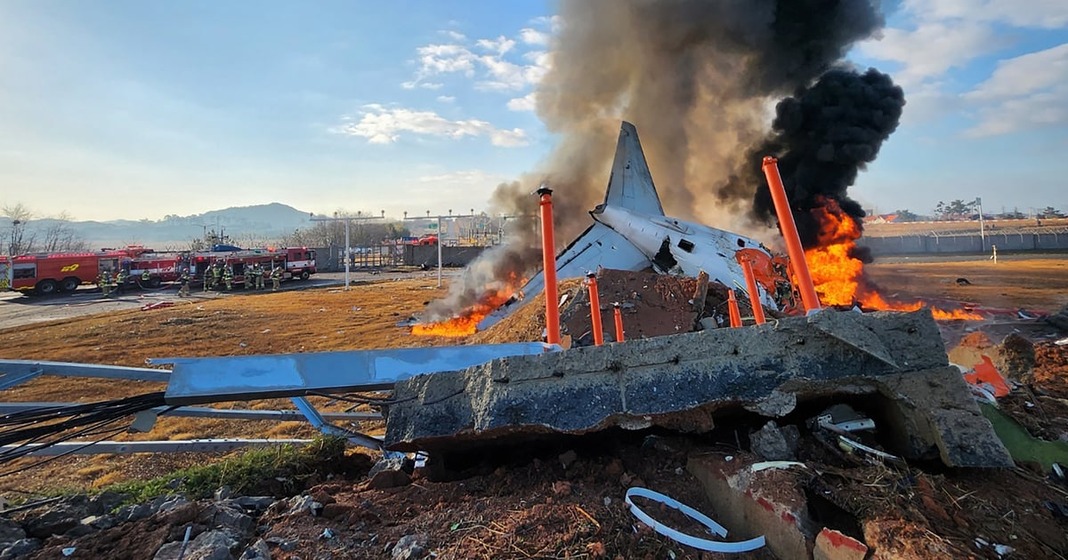Air Canada flight survives crash landing at airport
Seol/ Ottawa, Dec 30: Back to back incidents of air mishaps have shocked fliers around the world on Sunday as a South Korean plane crashed, leaving 179 people on board dead, while passengers on a Canadian flight survived a crash landing, both caused by landing gear failure.
The South Korean Jeju Air plane carrying 181 people from Bangkok to Muan International Airport in South Korea crashed on arrival Sunday, smashing into a barrier and bursting into flames, leaving 179 dead while two cabin staff could be pulled alive from the wreckage.
A bird strike and adverse weather conditions were cited by authorities as likely causes of the crash that flung passengers out of the plane and left it “almost completely destroyed”, according to fire officials.
Failure of landing gears caused the plane to land on its belly, skidding off the runway as smoke streamed out from the engines, before crashing into a wall and exploding in flames.
So far 151 people — 71 women, 71 men and nine others whose genders weren’t immediately identifiable — died in the fire, the country’s national fire agency said. Emergency workers pulled out two people, both crew members, to safety, and local health officials said they remain conscious.
The death toll is expected to rise further to 179 as the rest of the people aboard the plane remain missing about six hours after the incident.
Low-cost carrier Jeju Air apologised Sunday and vowed to do all it could to help after its plane carrying 181 people from Bangkok to South Korea crashed on arrival, killing scores.
“We at Jeju Air will do everything in our power in response to this accident. We sincerely apologise for causing concern,” the airline said in a statement posted on its social media channels.
The accident took place in a matter of minutes from 9:03 am (0003 GMT) on Sunday during the landing of Jeju Air Flight 2216, the Ministry of Land said, with 175 passengers, including two Thai nationals, and six crew onboard.
Two minutes before the crash, the pilot issued a Mayday call.
There was little chance that remaining passengers on a crashed Jeju Air flight survived, a South Korean fire department official said.
“The cause of the accident is presumed to be a bird strike combined with adverse weather conditions. However, the exact cause will be announced following a joint investigation,” an official said.
When asked if the accident happened due to the runway being too short — video shows the plane coming off the tarmac and hitting a wall — the official said this was likely not a factor.
“The runway is 2,800 meters long, and similar-sized aircraft have been operating on it without issues,” they said.
“It is unlikely that the accident was caused by the length of the runway.”
It is the first fatal accident in the history of Jeju Air, one of South Korea’s largest low-cost carriers, which was set up in 2005.
On August 12, 2007, a Bombardier Q400 operated by Jeju Air carrying 74 passengers came off the runway due to strong winds at the southern Busan-Gimhae airport, resulting in a dozen injuries.
South Korea’s aviation industry has a solid track record for safety, experts say.
A number of fatal aviation accidents have occurred globally due to bird strikes, which can cause a loss of power if the animals are sucked into the air intakes.
In 2009, a US Airways Airbus A320 famously landed in New York’s Hudson River after bird strikes on both of its engines, in an incident widely known as the “Miracle on the Hudson” because there was no loss of life.
With hours of the Jeju Air flight crash, an Air Canada flight coming from St John’s city had a rough landing at Halifax airport in Nova Scotia province that saw the aircraft skid down the runway and part of it catching fire.
A statement issued by the airport said the incident involved Air Canada Flight 2259, which was operated by PAL Airlines.
The incident happened around 9:30 pm local time. The statement does not say how many people were on the plane.
The people on board were evacuated, and then taken to a hangar to be checked out by paramedics, CBC News said.
Due to the incident, the Halifax airport was temporarily closed Saturday night.
A passenger told CBC News that one of the plane’s tyres did not deploy properly upon landing.
“The plane started to sit at about a 20-degree angle to the left and, as that happened, we heard a pretty loud — what almost sounded like a crash sound — as the wing of the plane started to skid along the pavement, along with what I presume was the engine,” she said.
The passenger said the plane then skidded down the runway for a “decent” distance as the pilots worked to stop the plane.
“The plane shook quite a bit and we started seeing fire on the left side of the plane and smoke started coming in the windows,” she said. (Agencies)




